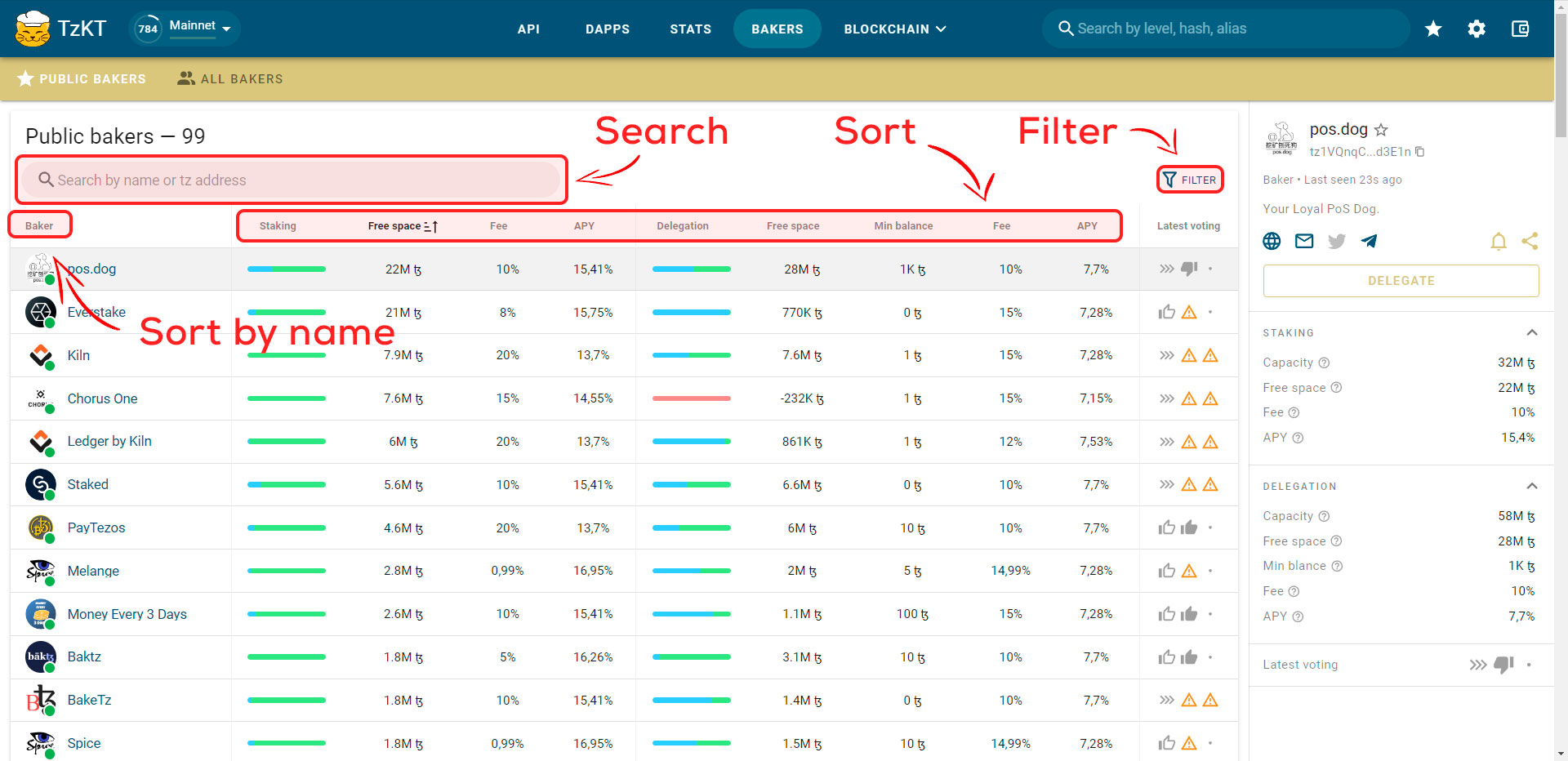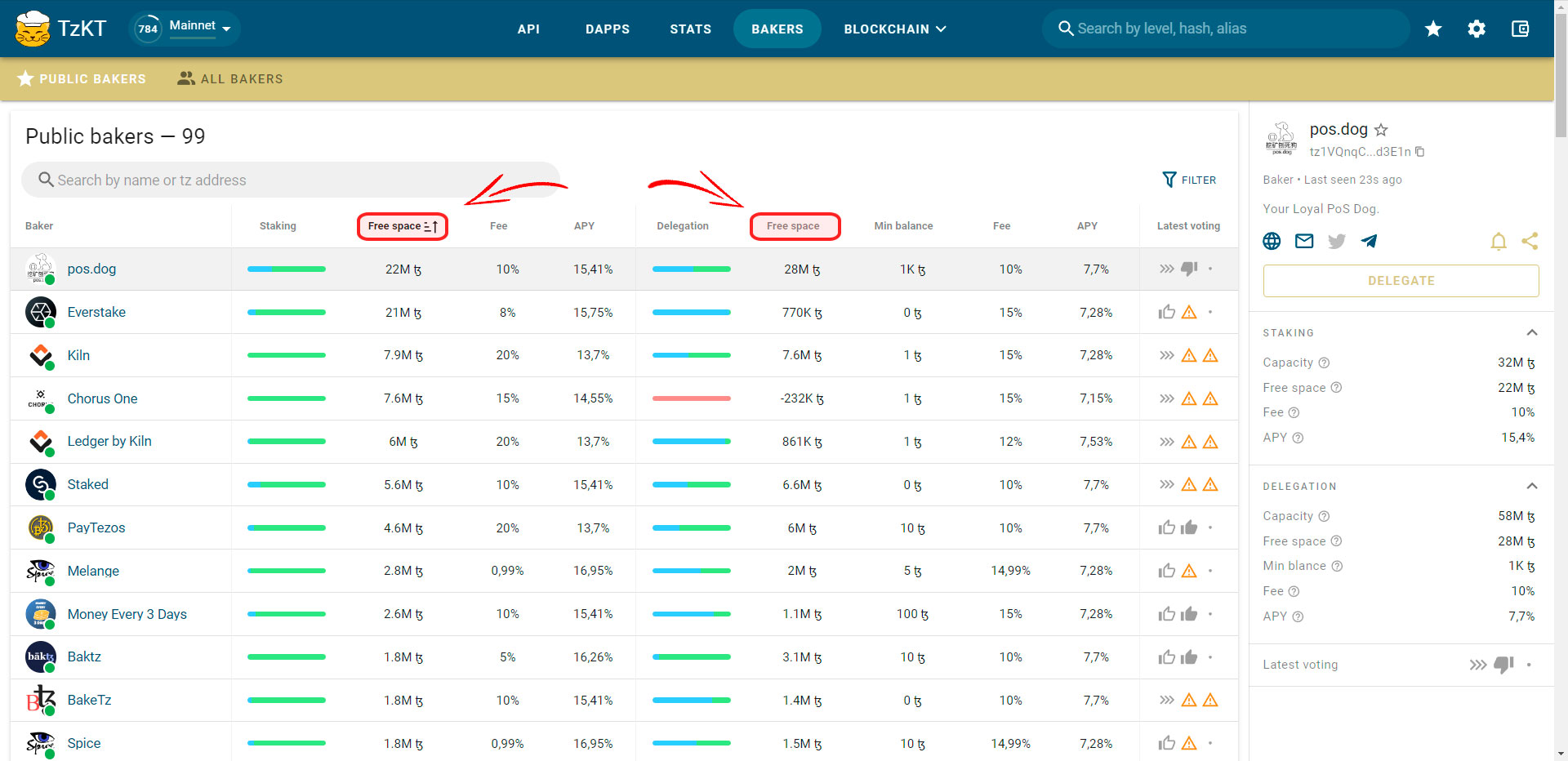One of the first questions Tezos newcomers often ask is: Which baker should I choose for staking or delegation?
The TzKT Bakers page provides a comprehensive comparison of bakers, with important stats such as "capacity," "free space," "fees," and "APY." These numbers are essential for making an informed decision, but if you're new, it's not always obvious what each one means or why it matters.
On TzKT you can also sort bakers by these criteria, capacity, free space, fee, APY, and minimum balance, which makes it easier to compare once you understand what the numbers represent.
This guide explains the key terms you'll see on TzKT, how to interpret them, and what factors to consider when choosing a baker.

Note: Make sure you are using the default tab "Public bakers", which displays bakers that are available for external users to interact with. To find other bakers, such as custodies or cryptocurrency exchanges (Coinbase, Binance, etc.) you can switch to the "All bakers" tab.
# Staking
# Capacity
The total amount of tez a baker can handle for staking (their own stake plus what others stake with them). A large capacity means more room for stakers, but if you're staking a smaller amount, this may not be as critical.
# Free Space
This shows how much more tez can still be staked before the baker hits their limit. If the free space runs out, new stakers won't earn the expected rewards. Choosing a baker with plenty of free space reduces the risk of them becoming overstaked by a large new staker, which could otherwise reduce your rewards.

# Fee
The commission the baker charges on staking rewards. Lower fees mean higher rewards for you, but fees shouldn't be the only factor, some users prioritize other qualities as well (more on that later). Keep in mind that bakers can change their fees over time, so it's worth checking periodically that the terms still fit your needs.
# APY
The estimated annual yield for stakers. A higher APY can be attractive, but it should be weighed alongside other considerations like reliability and governance activity. Note that there are different values for the delegation and for staking.

# Delegation
# Capacity
The maximum tez a baker can accept from delegators. Once full, new delegations may not earn rewards.
# Free Space
The amount of tez that can still be delegated before the baker reaches capacity. Once free space runs out, new delegators may not receive full rewards. Picking a baker with healthy free space lowers the risk that a large new delegator pushes the baker over capacity, which could shrink your share of rewards.
# Minimum Balance
The smallest amount of tez required to delegate and be eligible for rewards. Some bakers set a minimum amount of tez that they accept for delegations (this does not apply for staking), so if your delegation is smaller than this, you may not receive payouts.
# Fee
The baker's commission on delegation rewards. Like with staking, bakers may adjust their fees or payout schedules, so it's a good idea to monitor them from time to time.
# APY
The estimated annual yield for delegators. Delegation APY is lower than staking APY, because delegation has no lock-up period and no slashing risk.
Note: When considering your choice, make sure that you meet the requirements of the baker. For staking, this option should be allowed by the baker; for delegation, you should meet the min delegation amount, otherwise you won't receive delegation rewards.
# Baking Bot
Baking Bot can help you monitor the Delegation and Staking activity. Just connect your address and it will send notifications about delegation payments and staking rewards, so you will be able to see how much you earn. Also it will send notifications if the baker will change its terms. So you will be informed of any changes in staking or delegation fees, minimum balance update, or even baker termination.
# Beyond the Numbers
While these stats are important, choosing a baker is ultimately a personal decision shaped by your own goals and values. Here are a few additional factors worth considering:
Promises vs Efforts
Stats show you the promises: fees, APY, payout schedules. What matters just as much are the efforts: governance participation, ecosystem contributions, and payout reliability. Random factors like node efficiency exist, but for most bakers they even out over time.Governance Participation
Bakers play a critical role in Tezos governance by voting on protocol upgrades. Choosing a baker who actively participates helps strengthen the network and ensures your delegated stake contributes to decision-making.
Governance participation Communication
Some bakers provide channels such as Telegram, Discord, or email for delegators and stakers. If having a direct line of communication is important to you, this can be a deciding factor.
Socials Staking and Delegation Together
If you plan to stake part of your tez and delegate the rest, review both sets of stats for the same baker. Some optimize their terms for staking, others for delegation, and not all balance both equally.
# Putting It All Together
There is no universal "best baker." The right choice depends on your approach:
- If you're delegating only, focus on delegation APY, free space, and minimum balance.
- If you're staking only, look closely at staking APY and free space.
- If you're doing both, compare both sections carefully.
Equally important are the qualities you value: some people prioritize the lowest fees, others prefer bakers who are active in governance and community discussions, while others simply want clear communication channels.
The TzKT Bakers page gives you all the numbers you need. This guide gives you the context to interpret them. With both, you can choose a baker that aligns with your strategy and what you personally value in the Tezos ecosystem.
